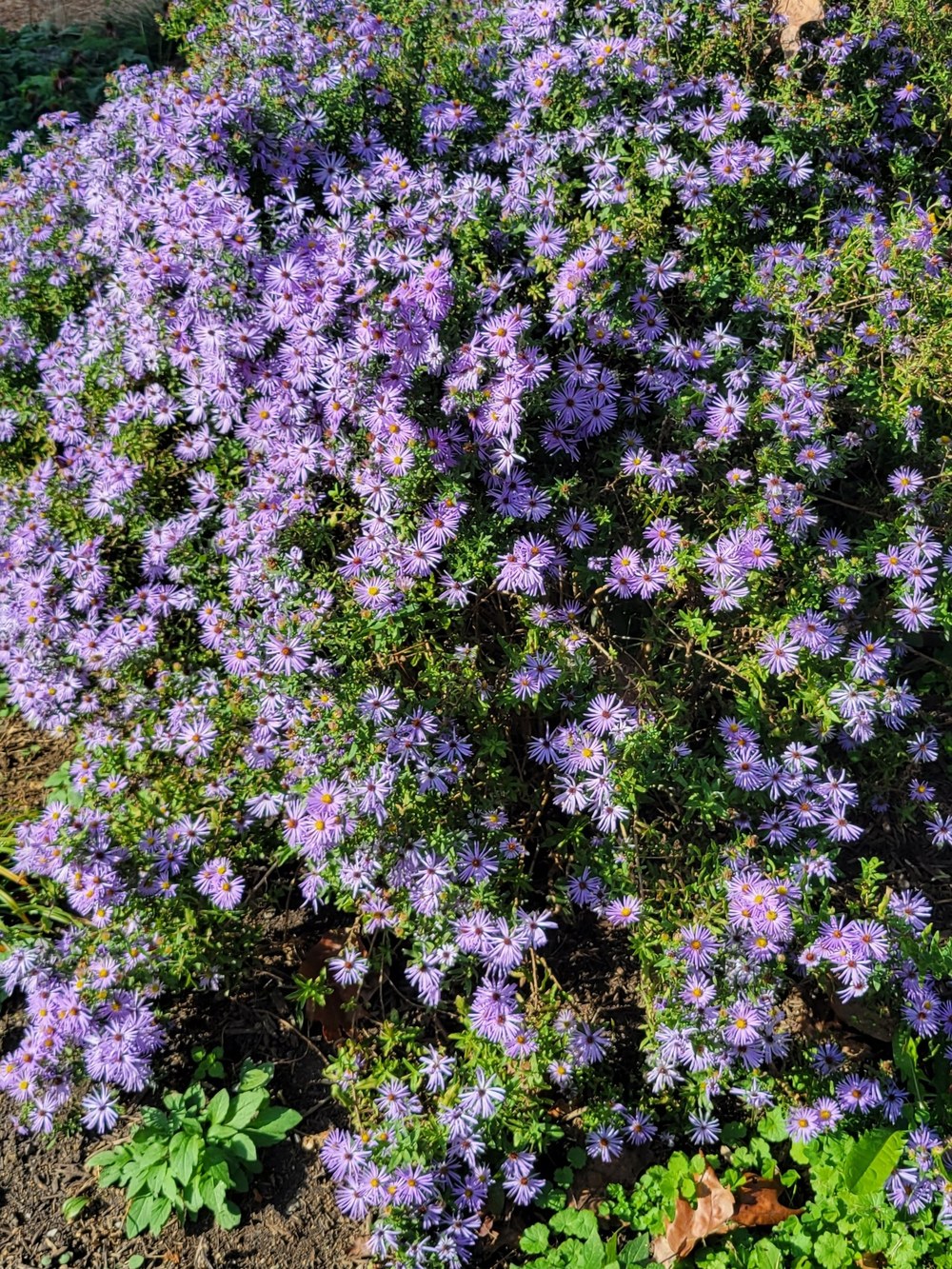Posted: November 4, 2021
Gardening involves things that can be done routinely at the same time every year. Our focus is on Native Plant Gardening and will include some general gardening as well. Though annual weather may influence timing of these tasks, these are the things to check off your list now that November has arrived.

Symphyotrichum oblongifolium, aromatic asters in the Native Plant Garden
November marks the end of our outdoor gardening - OR DOES IT?
You know the saying "it ain't over 'til it's over." With gardening that means it isn't over until the ground freezes! If you can get a spade in the ground, the soil can still be worked. The main thing here is to avoid overwatering. More on fall planting.
November is the last chance to get garden chores done that you've been putting off--before the first permanent snow and the long winter.
There is still puttering to do: cleaning and oiling tools to be put away for the winter; drain and store water hoses, sprayers, watering wands, drain irrigation systems, and any water features. Don't forget to clean out any greenhouses or sheds.
Keep weeding or cutting back weeds to the ground.
Weeds are hardy and will continue to grow and spread into late Fall. Some horticulturalists recommend cutting back weeds instead of pulling weeds. Remove weeds throughout the Fall. Many weeds that will die over winter have sown hundreds of seeds. For every weed you pull in the fall is 10 weeds you won't have in the spring.
Take a soil sample before it freezes.
Test for pH and nutritional levels. Don't guess what your soil needs. If the soil test indicates your soil pH needs to be raised or lowered, now is a good time to apply either lime or sulfur as needed.
Keep raking!
As leaves keep falling, they build up on the lawn and garden, creating thick mats that are hard to remove in the spring. Rake leaves into your garden beds, they make a great mulch. These leaves will help keep delicate roots covered and foster better growth in the spring. Remember many butterflies overwinter as chrysalis in the leaves.
In our planting area, Zone 6. apply winter mulch.
Once the ground freezes, apply a winter mulch to tuck in your favorite perennials, shrubs, and trees. Contrary to popular belief, applying winter mulch doesn't help keep your plants warm. Instead, it keeps the soil frozen all winter so your plants aren't damaged by the cycle of freezing and thawing that can happen on warm winter days.
Remove and dispose of diseased foliage.
Be sure to clean up any dead or diseased foliage to help prevent the diseases from coming back the next year. Do not put diseased foliage in your compost pile, bag it and put it in the trash.
This is an excellent time to plant or transplant shrubs.
If your soil temperatures have not dipped below 50 degrees Fahrenheit, you still have time to plant native shrubs. Soil temperatures below 50 degrees can slow germination and seedling emergence so take time to check soil temperature before planting. Keep watering them ahead of the ground freezing.
Fall Pruning
Trees should only be pruned when dormant which many of us think is just winter. After all the leaves have fallen and trees have gone dormant, they can be gently pruned. Any dangerous branches-injured, broken or diseased should be pruned away so they are not a bigger hazard in winter. Only prune when you're certain it isn't going to freeze soon.
Review this season's garden.
Decide which plants you will leave standing. Most pollinators benefit from us not cutting everything to the ground. Birds can eat the seeds off some plants. Plants with hollow stems or ones that have seeds that benefit pollinators. Other plants can stand through the winter.
November is a good time to take a good look at your landscaped areas.
Make notes on where you'll want to plant a new shrub or bush next year, or what's getting overcrowded and will require thinning. Read more from Penn State Master Gardeners.
One other activity for November is to put up bird feeder, and stock up on birdseed.
Get a heated birdbath as it will be a huge help to our feathered friends! They just keep the water from freezing not make the water hot!!! How to feed the birds.
If you celebrate Christmas, one other thing you could consider doing before the ground freezes--prepare the hole for your living tree to go in after the holidays are over.
~Pamela E. Hall, Master Gardener, Lancaster County

